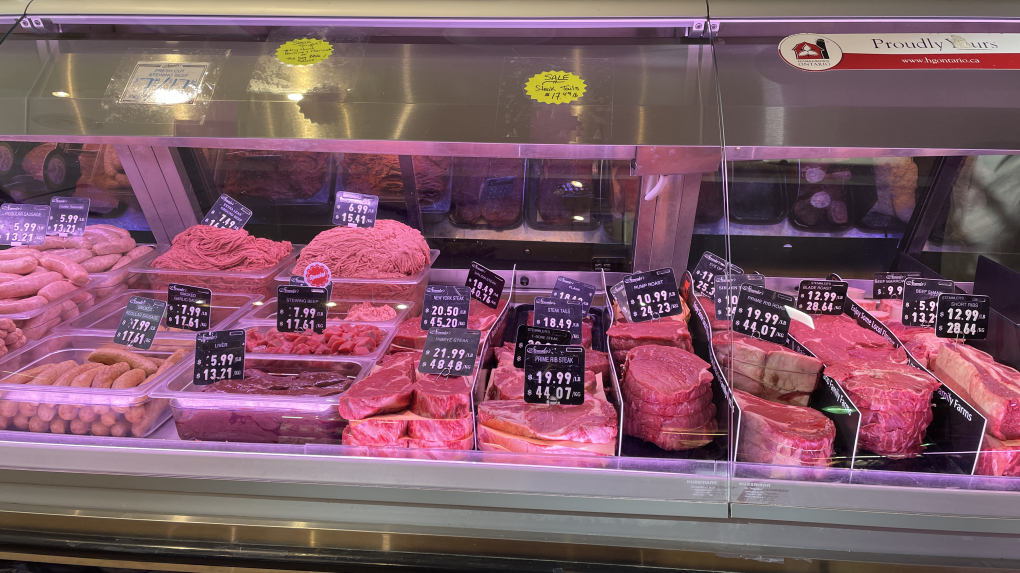Ontario farmers and consumers feeling burned by skyrocketing beef prices
Shoppers might experience some sticker shock when they see the price of beef at their local grocery store.
"The prices are definitely a little higher than what they've been in the past," admitted Jack Chaffe, a southwestern Ontario feedlot operator.
According to Statistics Canada, the average cost for a kilogram of ground beef is currently $13. Four years ago, it was selling for $10 a kilogram.
Sirloin steak, meanwhile, is now roughly $22 a kilogram – up from $6 in 2016.
"The pricing was just unbelievable," said shopper Wayne MacLean. "I mean, you get three little pieces of steak and you're paying, you know, $55 to $60.”
And it’s not just shoppers feeling burned.
Ontario farmers and butchers are facing their own uphill battle to stay in the game.
"Likely the biggest thing is the investment in feeder cattle and the feed part,” Chaffe explained. “A lot of capital tied up in our operation.".
Farmers say the cost of feed, fuel and farming equipment have soared, leaving razor thin margins.
"At this point, we're basically breaking even on most of our cattle,” added Chaffe. “If not, we're maybe losing a little bit of money.”
Stemmler's Meats, a butcher shop based out of Heidelberg, Ont., has noticed a change in the spending habits of shoppers.
"We see, at times, that people may purchase a less expensive kind of protein, or they may shop for price-based specials, so that's just changing their buying patterns," explained Stemmler's Meats President Terry Stemmler.
 Beef on display at Stemmler's Meats in Heidelberg, Ont. (Hannah Schmidt/CTV News)
Beef on display at Stemmler's Meats in Heidelberg, Ont. (Hannah Schmidt/CTV News)
Experts say a mix of inflation and global demand is partly to blame for the recent price surge.
"We've seen an incredible demand for Canadian beef," said Jamie Kerr, a market analyst with Canfax. "The consumer, they're really looking to put beef on the center of their plates."
Kerr also noted that climate change has been a huge factor.
"We have seen a decline in the Canadian cattle herd since 2020. It is drought related,” he said. “There is a smaller supply of beef and, in that instance, we do rely on imports."
With beef being priced the way it is, consumers could turn to other alternatives during the holiday season.
"All food [pricing] is discouraging,” said shopper Robert Balcerzak. “You know what's going to be taken off the list? Beef. It's at its highest price. So everybody's moving down a few notches."
CTVNews.ca Top Stories

Calgary woman stranded in Mexico after husband's death during diving trip
A Calgary woman is struggling to return home after her husband died while diving in Mexico, leaving her stranded and facing financial hardship.
Fugitive U.S. rioter seeks asylum in Whistler amid warnings of more to come
An American citizen convicted of participating in the Jan. 6, 2021, riot on Capitol Hill and dodging jail time in Whistler may just be the start of an asylum-seeking rush, according to a prominent legal expert.
Special national Liberal caucus meeting called for next week after regional chairs meet: sources
A special meeting of Prime Minister Justin Trudeau's national Liberal caucus has been called for next Wednesday, sources say.
N.S. community shocked by deaths of father, daughter; suspect was wanted in Toronto shooting
A Nova Scotia community is mourning the loss of two of its members after they were shot and killed in Halifax on New Year's Eve.
Canada pausing applications for parent, grandparent permanent residency sponsorships
Canada will not accept new parent and grandparent permanent residency sponsorship applications until further notice, according to a ministerial directive.
Soldier who blew up Tesla at Trump hotel left note saying blast was to be a 'wakeup call' for the U.S.
A highly decorated Army soldier who fatally shot himself in a Tesla Cybertruck just before it blew up outside the Trump hotel in Las Vegas left notes saying the New Year's Day explosion was a stunt to serve as a “wakeup call” for the country’s ills, investigators said Friday.
Sea and Himalayan salts recalled in Canada: 'Do not use, serve or distribute'
Two brands of sea and Himalayan salt are being recalled in Canada due to pieces of plastic found in the products.
'Inadmissible' foreign nationals to pay more upon return to Canada: CBSA
Foreign nationals who refuse or are unable to pay their own way home after being denied stay in Canada will soon face steeper financial penalties should they ever attempt to return.
'It's about time': Experts in Canada support call for warnings about cancer risk from alcohol
While Canada hasn't mandated cancer warnings for alcoholic beverages, a few experts are supporting a new push in the U.S. to have the labels on the products.

































